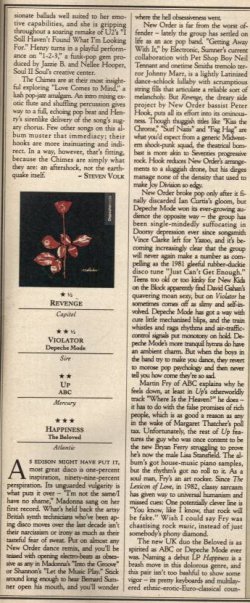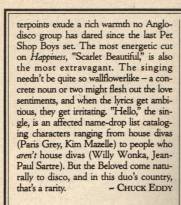Violator
[Rolling Stone, 14th June 1990, Words: Chuck Eddy.]


As Edison might have put it, most great disco is one-percent inspiration, ninety-nine-percent perspiration. Its unguarded vulgarity is what puts it over – “I’m not the same / I have no shame,” Madonna sang on her first record. What’s held back the artsy British synth technicians who’ve been aping disco moves over the last decade isn’t their narcissism or irony as much as their tasteful fear of sweat. Put on almost any New Order dance remix, and you’ll be teased with opening electro-beats as obsessive as any in Madonna’s “Into The Groove” or Shannon’s “Let The Music Play”. Stick around long enough to hear Bernard Sumner open his mouth, and you’ll wonder where the hell obsessiveness went.
New Order is far from the worst offender – lately the group has settled on life as an ace pop band. “Getting Away With It”, by Electronic, Sumner’s current collaboration with Pet Shop Boy Neil Tennant and onetime Smiths tremolo terror Johnny Marr, is a lightly Latinized dance-schlock lullaby with scrumptious string fills that articulate a reliable sort of melancholy. But Revenge, the dreary side project by New Order bassist Peter Hook, puts all its effort into its ominousness. Though thuggish titles like “Kiss The Chrome”, “Surf Nazis” and “Fag Hag” are what you’d expect from a generic Midwestern shock-punk squad, the theatrical bombast is more akin to Seventies progressive rock. Hook reduces New Order’s arrangements to a sluggish drone, but his dirges manage none of the density that used to make Joy Division so edgy.
New Order broke pop only after it finally discarded Ian Curtis’ gloom, but Depeche Mode won its ever-growing audience the opposite way – the group has been single-mindedly suffocating in Doorsy depression ever since songsmith Vince Clarke left for Yazoo, and it’s becoming increasingly clear that the group will never again make a number as compelling as the 1981 gleeful rubber-duckie disco tune “Just Can’t Get Enough”. Teens too old or too kinky for New Kids On The Block apparently find David Gahan’s quavering moan sexy, but on Violator he sometimes comes off as slimy and self-involved. Depeche Mode has got a way with cute little mechanized blips, and the train whistles and raga rhythms and air-traffic-control signals put monotony on hold. Depeche Mode’s more tranquil hymns do have an ambient charm. But when the boys in the band try to make you dance, they revert to morose pop psychology and then never tell you how come they’re so sad. [1]
Martin Fry of ABC explains why he feels down, at least in Up’s otherworldly track “Where Is The Heaven?” he does – it has to do with the false promises of rich people, which as as good a reason as any in the wake of Margaret Thatcher’s poll tax. Unfortunately, the rest of Up features the guy who was once content to be the new Bryan Ferry struggling to prove he’s now the male Lisa Stansfield. The album’s got house-music piano samples, but the rhythm’s got no roll to it. As a soul man, Fry’s an art rocker. Since The Lexicon Of Love, in 1982, classy sarcasm has given way to universal humanism and missed cues: One potentially clever line is “You know, like I know, that rock will be fake.” Wish I could say Fry was chastising rock music, instead of just somebody’s phoney diamond.
The new UK duo the Beloved is as spirited as ABC or Depeche Mode ever was. Naming a debut LP Happiness is a brash move in this dolorous genre, and this pair isn’t too bashful to show some vigor – its pretty keyboards and multilayered ethnic-erotic-Euro-classical counterpoints exude a rich warmth no Anglo-disco group has dared since the last Pet Shop Boys set. The most energetic cut on Happiness, “Scarlet Beautiful”, is also the most extravagant. The singing needn’t be quite so wallflowerlike – a concrete noun or two might flesh out the love sentiments, and when the lyrics get ambitious, they get irritating. “Hello”, the single, is an affected name-drop list cataloging characters ranging from house divas (Paris Grey, Kim Mazelle) to people who aren’t house divas (Willy Wonka, Jean-Paul Sartre). But the Beloved come naturally to disco, and in this duo’s country, that’s a rarity.
[Rolling Stone, 14th June 1990, Words: Chuck Eddy.]
" Teens too old or too kinky for New Kids On The Block apparently find David Gahan’s quavering moan sexy... "
An interesting item containing reviews of four albums including Violator (the others being by New Order, ABC and The Beloved), in an attempt to compare and contrast the four. The comments on Violator are so-so and not particularly penetrating, and it's a shame the writer didn't take the comparisons idea further.


As Edison might have put it, most great disco is one-percent inspiration, ninety-nine-percent perspiration. Its unguarded vulgarity is what puts it over – “I’m not the same / I have no shame,” Madonna sang on her first record. What’s held back the artsy British synth technicians who’ve been aping disco moves over the last decade isn’t their narcissism or irony as much as their tasteful fear of sweat. Put on almost any New Order dance remix, and you’ll be teased with opening electro-beats as obsessive as any in Madonna’s “Into The Groove” or Shannon’s “Let The Music Play”. Stick around long enough to hear Bernard Sumner open his mouth, and you’ll wonder where the hell obsessiveness went.
New Order is far from the worst offender – lately the group has settled on life as an ace pop band. “Getting Away With It”, by Electronic, Sumner’s current collaboration with Pet Shop Boy Neil Tennant and onetime Smiths tremolo terror Johnny Marr, is a lightly Latinized dance-schlock lullaby with scrumptious string fills that articulate a reliable sort of melancholy. But Revenge, the dreary side project by New Order bassist Peter Hook, puts all its effort into its ominousness. Though thuggish titles like “Kiss The Chrome”, “Surf Nazis” and “Fag Hag” are what you’d expect from a generic Midwestern shock-punk squad, the theatrical bombast is more akin to Seventies progressive rock. Hook reduces New Order’s arrangements to a sluggish drone, but his dirges manage none of the density that used to make Joy Division so edgy.
New Order broke pop only after it finally discarded Ian Curtis’ gloom, but Depeche Mode won its ever-growing audience the opposite way – the group has been single-mindedly suffocating in Doorsy depression ever since songsmith Vince Clarke left for Yazoo, and it’s becoming increasingly clear that the group will never again make a number as compelling as the 1981 gleeful rubber-duckie disco tune “Just Can’t Get Enough”. Teens too old or too kinky for New Kids On The Block apparently find David Gahan’s quavering moan sexy, but on Violator he sometimes comes off as slimy and self-involved. Depeche Mode has got a way with cute little mechanized blips, and the train whistles and raga rhythms and air-traffic-control signals put monotony on hold. Depeche Mode’s more tranquil hymns do have an ambient charm. But when the boys in the band try to make you dance, they revert to morose pop psychology and then never tell you how come they’re so sad. [1]
Martin Fry of ABC explains why he feels down, at least in Up’s otherworldly track “Where Is The Heaven?” he does – it has to do with the false promises of rich people, which as as good a reason as any in the wake of Margaret Thatcher’s poll tax. Unfortunately, the rest of Up features the guy who was once content to be the new Bryan Ferry struggling to prove he’s now the male Lisa Stansfield. The album’s got house-music piano samples, but the rhythm’s got no roll to it. As a soul man, Fry’s an art rocker. Since The Lexicon Of Love, in 1982, classy sarcasm has given way to universal humanism and missed cues: One potentially clever line is “You know, like I know, that rock will be fake.” Wish I could say Fry was chastising rock music, instead of just somebody’s phoney diamond.
The new UK duo the Beloved is as spirited as ABC or Depeche Mode ever was. Naming a debut LP Happiness is a brash move in this dolorous genre, and this pair isn’t too bashful to show some vigor – its pretty keyboards and multilayered ethnic-erotic-Euro-classical counterpoints exude a rich warmth no Anglo-disco group has dared since the last Pet Shop Boys set. The most energetic cut on Happiness, “Scarlet Beautiful”, is also the most extravagant. The singing needn’t be quite so wallflowerlike – a concrete noun or two might flesh out the love sentiments, and when the lyrics get ambitious, they get irritating. “Hello”, the single, is an affected name-drop list cataloging characters ranging from house divas (Paris Grey, Kim Mazelle) to people who aren’t house divas (Willy Wonka, Jean-Paul Sartre). But the Beloved come naturally to disco, and in this duo’s country, that’s a rarity.
[1] - I feel personally that part of Depeche Mode's appeal in this era is precisely this. If the lyrics were to become specific, they would suddenly lose a lot of their resonance with the thousands of fans - particularly in America where they were such a phenomenon in 1990 - who found in the songs a way of giving voice to their own thoughts.
Last edited:
